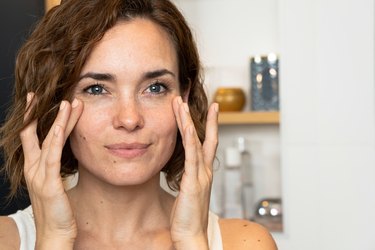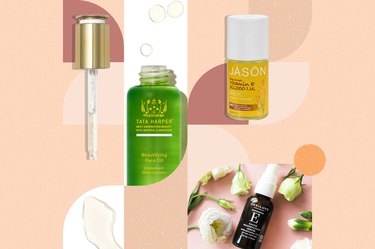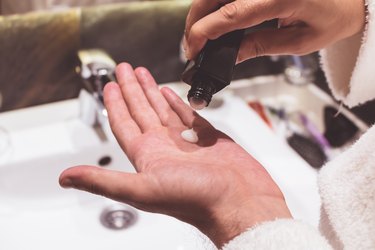
It seems like every day there's a new trending "it" product that promises to deliver incredible results to your skin, including topical solutions, facial tools and devices and even powders and supplements.
While these products are often dressed up as new and innovative, the reality is that many of them have been around for quite some time — some for even thousands of years. One such product is beef tallow.
Video of the Day
Video of the Day
Here's what beef tallow is and its potential benefits and risks, along with other ways to naturally improve your skin health.
What Is Beef Tallow?
As the name implies, beef tallow comes from cows. You might be wondering why someone would ever think to put something that came from a cow on their skin, let alone their face, but there's a lot to learn and appreciate about the skin benefits of beef tallow.
Put simply, beef tallow is the rendered fat from beef that has been cooked down and somewhat distilled to remove impurities.
"Beef tallow (like other types of saturated fat) is white in color and solid at room temperature, but melts when heated, such as when it is used in cooking," functional dietitian Jenna Volpe, RDN, LD, tells LIVESTRONG.com. "Beef tallow can be used as a cooking fat (in place of butter or lard), but it can also be applied topically for skin care purposes."
What Are the Skin Benefits of Beef Tallow?
Because beef tallow is rich in myriad fatty acids — including linoleic, gamma-linolenic acid, alpha-linolenic acid and docosahexaenoic acid, to name a few — it has impressive moisturizing capabilities. One of the key fatty acids found in beef tallow is omega-3.
"These help maintain the health and integrity of the skin barrier, and some possess antioxidant properties to protect skin from oxidative stress," explains Brendan Camp, MD, a Manhattan-based dermatologist at MDCS Dermatology.
Another fatty acid in beef tallow, conjugated linoleic acid (CLA), offers an anti-inflammatory benefit and has been shown to help with conditions like psoriasis and eczema, according to one February 2021 study in Experimental Dermatology.
Beef tallow also contains fat-soluble vitamins A, D, E and K, all of which offer antioxidant benefits and can support overall skin health by helping to boost collagen production, notes Marisa Garshick, MD, dermatologist at Medical Dermatology & Cosmetic Surgery in New York.
These vitamins are commonly found in all sorts of topical skin care products that claim to reduce hyperpigmentation and the appearance of fine lines and wrinkles. (It's worth noting here, though, that even though it contains vitamin A, beef tallow is not the same as retinol.)
Last, but certainly not least, beef tallow is considered to be hypoallergenic, which means it naturally contains very few allergens. This makes it ideal for people with sensitive skin because it's extremely unlikely to produce a negative or adverse reaction, says Mariano Busso, MD, a board-certified dermatologist in Miami.
Still, more research is needed to fully determine the benefits of beef tallow for skin, including whether it can actually reduce wrinkles or tighten skin, as many brands claim.
Are There Any Risks to Using Beef Tallow on Your Skin?
Beef tallow is not approved by the FDA for use in skin care products due to the potential risk for mad cow disease, which goes by the medical name bovine spongiform encephalopathy.
What makes it risky is that there is no standard for how it is sourced or from where it is derived. Just like other types of food, not all beef tallow is the same quality-wise.
"For example, beef tallow sourced from pasture-raised, grass-fed cows will usually be higher in omega-3 fatty acids and vitamin A compared to beef tallow that comes from grain-fed, factory-farmed cows," Volpe says.
Depending on the nutrition profile, some types of beef tallow may be comedogenic, meaning they can cause or worsen acne. Or, if a fragrance or scented oil is added to mask the smell of the beef tallow, that might irritate sensitive skin or worsen acne for some people.
So, if you're going to try beef tallow as a moisturizer, look for grass-fed tallow and make sure the product has a short ingredient list (more ingredients mean more things that could potentially irritate your skin).
Other Ways to Naturally Improve the Health of Your Skin
Most people considering using beef tallow to boost their skin health are simply looking for a natural solution. So we asked dermatologists to share their best tips for getting a natural glow:
1. Eat a Healthy Diet Rich in Antioxidants
The main draw to beef tallow is that it's rich in antioxidants, but so are plenty of other foods you can incorporate into your diet.
"Eating fruits and vegetables, such as broccoli, spinach, carrots, beets, avocados and artichokes, helps improve the overall health of the skin by protecting the skin against free radical damage," says Dr. Garshick.
2. Reduce Your Stress Level
Believe it or not, your stress level can directly affect the health (and look!) of your skin. This is due to the stress hormone cortisol, which increases the amount of oil your pores produce, leading to breakouts, redness, dullness and increased sensitivity, notes Dr. Garshick.
"While easier said than done, stress can impact the skin, so finding ways to reduce stress can be helpful," she says. "This may mean through meditation, yoga or finding something that you enjoy doing."
3. Use Products Containing Plant-Based Oils
Plant-based oils, such as argan, avocado and grapeseed oil, are found in plenty of skin care products, and Dr. Camp recommends them as great alternatives for those looking for natural ingredients.
"They offer the benefits of improving moisture while delivering minerals and antioxidants to the skin," he says.
4. Drink Lots of Water
Water keeps your skin moisturized internally (from the inside out), notes Dr. Busso. If you are dehydrated, you risk your skin appearing dull and showing more signs of aging.
Also, he recommends incorporating water-dense foods in your diet like cucumbers, watermelon and lettuce.
The Bottom Line
While applying beef tallow topically can be potentially beneficial for the skin, it isn't regulated by the FDA and there isn't any research correlating beef tallow with healthier skin. And depending on the quality of the product, it may irritate your skin or worsen acne.
For these reasons, it may be better to reach for other natural skin care products, especially those containing plant-based oils like argan, avocado and grapeseed oil.
When in doubt, consider scheduling an appointment with your dermatologist to determine what skin care products might work best for your specific skin type and needs.
- Jenna Volpe, RDN, LD, CLT, a functional dietitian
- Brendan Camp, MD, a Manhattan-based dermatologist at MDCS Dermatology
- Experimental Dermatology: Topical application with conjugated linoleic acid ameliorates 2, 4-dinitrofluorobenzene-induced atopic dermatitis-like lesions in BALB/c mice
- Marisa Garshick, MD, dermatologist at Medical Dermatology & Cosmetic Surgery in New York
- Mariano Busso, MD, a board-certified dermatologist in Miami
- FDA: CFR - Code of Federal Regulations Title 21
Is this an emergency? If you are experiencing serious medical symptoms, please see the National Library of Medicine’s list of signs you need emergency medical attention or call 911.





